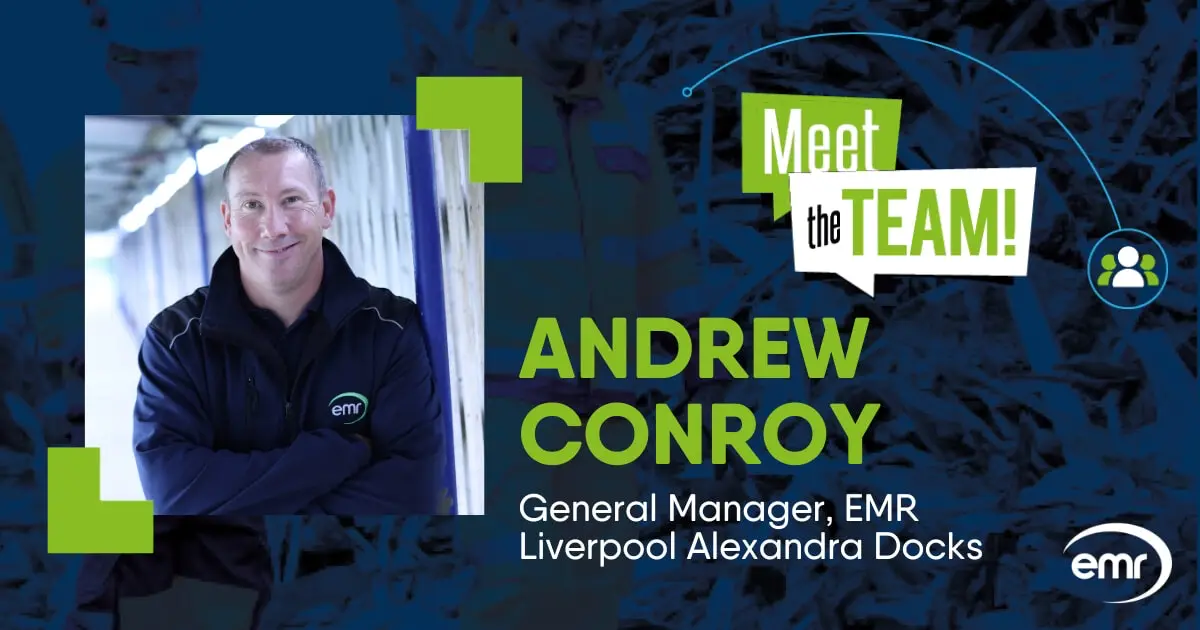CHOOSE
A DIFFERENT TERRITORY
As the man who keeps the UK's largest shredder facility running, Andy Conroy plays a key role in taking the materials in end-of-life vehicles (ELVs) and returning them to the circular economy.

“My job starts with ensuring that what comes into our site – whether that’s an ELV (End of Life Vehicle) or steel from a demolition site – is at the correct grade and quality, and that there are no contaminants which could go into the shredder. For ELVs, this is important because there are gases, oils and coolants involved. Each car, therefore, goes through a depollution process before it gets anywhere near the shredder,” he says.
While this helps ensure EMR’s sites maintain the highest possible environmental protection standards, Andy says safety is also of paramount importance.
“We lead by example – and that starts at the top. Every member of the team is highly trained in health and safety, and they all know that, if they see anything that concerns them, they should challenge it.”
The key to running a safe site is good communication, he adds.
“All of the different teams within the site, from the maintenance team, the export team to the general shredder team work hand in hand to make sure we are working efficiently and safely. We operate an open and transparent work environment, so everyone knows what’s happening on the site at all times.”
It is two years since Andy joined EMR and he says the scale of the operation at Liverpool Alexandra Docks has allowed him to build his skills and experience at pace.
“I have been in the fortunate position of being on a site with the biggest shredder and the biggest export facility in the UK. Over the past two years, EMR has provided me with a lot of training and development, and I am pleased to say that every single employee who works for me has had really good training, too. EMR, as a company, understands what you get back when you invest in your team.”
One significant challenge on the horizon for EMR Liverpool Alexandra Docks – and the business globally – is the commitment it has made to reach net-zero carbon emissions by 2040. The facility was one of the first to have a fully electric enabled crane installed – replacing a diesel-run predecessor – and the investment is continuing, Andy says:
“We’re about to upgrade parts of our process to include proven elements already deployed in EMR Willesden and uses artificial intelligence to drive the shredder’s motor, based on the weight and density of the material it’s processing. If I'm running lightweight material through it, it will reduce the power of the shredder and, if I suddenly throw something heavy through, it will automatically and instantaneously give it that extra bit of boost. Just by installing that, we'll save 20 to 25% electricity.
“In addition, from a wear and tear point of view, because it's an intelligent system, it'll help protect the shredder a lot more.”
The arrival of the variable speed drive system will also help Andy and his team gain more data about how to recycle ELVs even more efficiently in the future.
“Right now, we’re running a trial to better understand the yield we get from vehicles – both smaller cars and larger cars and vans – and how we can increase the quality and grade of material we’re then able to sell back into the circular economy. Where we’re getting a poor yield, we can look to improve this but, at the same time, if a customer is delivering ELVs with particularly high-quality grades of metal, then this trial will potentially allow us to pass on a preferential price too.”
This latest project is yet another example of how Andy and the rest of his EMR colleagues are helping to create a more advanced, reactive ELV recycling operation that’s fit for the challenges and opportunities that lie ahead.
Read about other people who make EMR a great place to work, learn about our culture and values, or see our latest vacancies.